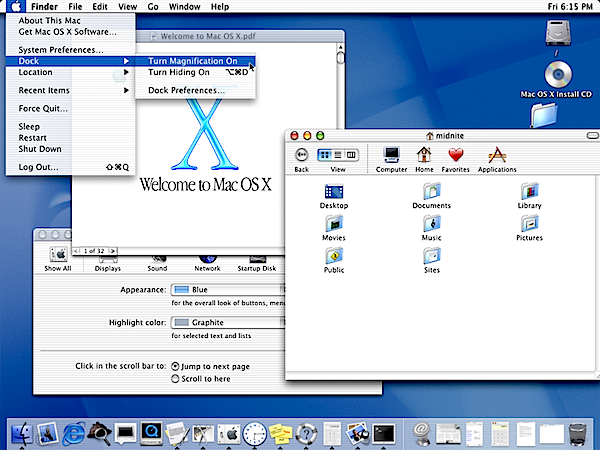Happy Birthday, Mac OS X!

A decade ago today, Apple released Mac OS X 10.0. But the real celebration should be for v10.1, which released in September 2001. Apple gave birth to a new operating system that spent six months in an incubator, having been born prematurely. How strange that yesterday, a day before Mac OS X's tenth anniversary, Apple announced the departure of Bertrand Serlet, who is regarded as the father of Mac OS X.
Into the Incubator
I got a bad reputation among over-zealous Mac fans for writing stories like this one, on March 7, 2001, for CNET News.com: "Mac OS X code released, despite missing features." I observed that Mac OS X would ship without support for basic features like DVD drives and laptop sleep mode. Mac OS X 10.0 didn't fully support Apple's own hardware and took away features that Mac users had in v9.x.
The follow-up story was more explicit: Mac OS X 10.0 "will not support CD-rewritable, DVD or DVD-recording drives" -- even though movie making was a longstanding Mac selling point and Apple had included CD burning in iTunes. I later learned that the new operating system also had problems with external storage devices, too, as Apple hadn't yet made APIs available to developers.
Mac OS X also lacked major developer application support -- for three reasons:
1. The operating system wasn't ready, even though Apple and many Mac enthusiasts failed to admit it. That Apple wouldn't ship Mac OS X 10.0 on new computers for several more months (May 2001) was indication enough the software birthed prematurely.
2. Mac OS X represented a major shift for Apple operating systems. It was fundamentally different from Mac OS 9.x and required developers to port or rewrite applications. Apple provided excellent tools, but developers moved cautiously. Apple's biggest developer supporter would turn out to be Microsoft, which released a new Mac version of Office about two months after Mac OS X 10.1 shipped.
3. Apple made a major OS transition during a recession, when computer sales were sluggish, the company reported quarterly losses and while Microsoft wrapped up development for Windows XP. Mac OS X simply wasn't a high developer priority, particularly when Apple wasn't shipping the operating system on new computers and Mac market share was low.
It's Classic!
Apple made many smart decisions bringing to market Mac OS X 10.0, which lineage traces back to NeXT. Near the end of 1996, Apple bought Steve Jobs' NeXT Computer, mainly for the operating system. But Apple also got Jobs and terrific developers, like Serlet; the NeXT team started improving Mac OS right away. Version 8.5, which shipped on trendy, translucent iMacs in 1998, brought many tweaks and tucks and great improvements to performance and stability, which got even better with v9.x.
The very stable Mac OS 9.x would become OS X's "Classic" mode. Inside the box, Apple packed the new and old Mac OS versions. Users could launch the older operating system within the newer for running older applications. It was a smart way of providing backward compatibility while offering a completely new operating system.
Perhaps Apple learned something from Microsoft's mistakes. Microsoft had long made backward compatibility a top development priority, but to a fault. Newer Windows versions needed to be compatible with older applications. Then Microsoft made a break from the priority, breaking applications in the process. Windows 2000, which launched in February 2000, was Microsoft's next-generation operating system -- derived from NT and free of legacy MS-DOS. But it had huge compatibility problems with older applications (particularly enterprise in-house developed), existing hardware and games. Microsoft would later fix many, but not all, of these compatibility problems with Windows XP.
Using Classic mode, Apple protected its future operating system from legacy code while providing users a way to use their past applications. Besides Classic mode, Apple provided excellent developer tools for allowing third-party applications to run on OS X rather than OS 9.x classic and for writing more-native apps that better tapped into core new features.
Born to Greatness
Some children, even those birthed prematurely, are born to greatness. Mac OS X left the incubator with the September 2001 release of v10.1. Apple preempted Windows XP's launch by several weeks, releasing Mac OS X 10.1 to much better reviews. The upgrade was feature complete, although OS X still needed more third-party applications. They would come.
Apple followed 10.0 and 10.1, codenamed Cheetah and Puma, respectively, with Jaguar in August 2002. Panther (10.3): October 2003. Tiger (10.4): April 2005. Leopard (10.5): October 2007. Snow Leopard (10.6): August 2009. Version 10.7, Lion, is expected in summer. Apple released four OS X upgrades between the release of Windows XP's gold code and widespread availability of Windows 7.
As I explained in February, four products released in 2001 are foundational to everything Apple has released since -- Apple Store (OK, it's a thing not a product), iTunes, iPod and Mac OS X (two versions). From Mac OS X, Apple derived iOS. While Apple's Mac OS X development seemed to slow down during the latter Noughties, it merely shifted focus -- first to getting out Intel-based OS X and building up iOS as a major mobile platform. Lion promises to bring back to Mac OS X features developed for iOS.
Mac OS X may have birthed prematurely, but it has reached adulthood and even spawned progeny in iOS. But I've got to say, as a reporter covering OS X from before its release, 10 years ago it was inconceivable that the operating system would be where it is today. Happy Birthday, Mac OS X!
Please share your Mac OS X memories (whether positive or negative) in comments, or email joewilcox at gmail dot com.
Screenshot Source: Wikipedia